December 2014
An Update from Director John Waller
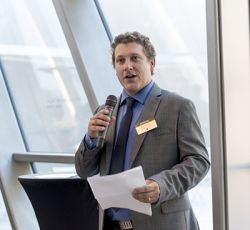
I am proud to present the second installment of our Social Science Scholars newsletter. This is an opportunity for me to tell you more about the students who make up our inaugural cohort in this program and to introduce and thank some of the many alumni, donors and friends who add so much to this new initiative within the College of Social Science. I welcome you to read these brief articles and to reply to me with comments, questions and suggestions you may have for our program.
It has been a pleasure getting to know our first cohort of Scholars, helping them to adjust to campus life, and seeing their academic skills improve. Much is expected of these students and so it has also been reassuring to know that they have community mentors to whom they can turn for support and advice. I am especially keen to see these relationships mature over the coming years. We are currently working on the next phases of the program: 1. Planning the study abroad in Cambridge and London; 2. Hiring an associate director who can teach the sophomore Scholars seminar; and 3. Recruiting the next cohort. If you have a relationship with a high school or know of any bright and articulate high school seniors who care deeply about social and political affairs, then please do draw the Social Science Scholars Program to their attention.
Above all else, this semester has illustrated how much can be achieved through collaboration. Dozens of people – faculty, alumni, and administrators - have gladly given up their time to teach the Scholars and to provide them with the support and guidance they need. Here are a few of my personal highlights (with some difficulty I limited myself to six):
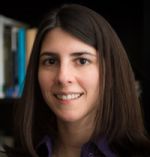 Dr. April Zeoli, who led one of our first seminars, studies the relationship between gun ownership and crime and we were keen for her to come in to press home the importance of basing one's beliefs on a proper methodology.
Dr. April Zeoli, who led one of our first seminars, studies the relationship between gun ownership and crime and we were keen for her to come in to press home the importance of basing one's beliefs on a proper methodology.
Wonderfully, Dr. Zeoli began sentence after sentence with the phrase, music to the serious researcher’s ears, ‘the research suggests that …’. Over the break I am having the phrase laminated and affixed to our ‘wall of wisdom’.
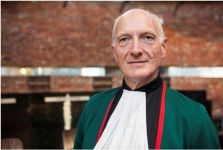 Justice Edwin Cameron Skyped in for 45 minutes to one of our classes and answered a series of questions with a degree of eloquence that took one's breath away. Justice Cameron - featured in this New York Times article - is a simply brilliant man. He is one of South Africa’s leading judges, was at the forefront of the struggle against Apartheid, acted as an advisor to Nelson Mandela on HIV policy, and he was an important participant in the campaign to secure affordable anti-retrovirals to the South African population. His autobiographical works (Witness and Justice) are quite superb. After the Skype session, Justice Cameron emailed: ‘Delighted to be with your students. It was quite a pleasure engaging with you and with them.’
Justice Edwin Cameron Skyped in for 45 minutes to one of our classes and answered a series of questions with a degree of eloquence that took one's breath away. Justice Cameron - featured in this New York Times article - is a simply brilliant man. He is one of South Africa’s leading judges, was at the forefront of the struggle against Apartheid, acted as an advisor to Nelson Mandela on HIV policy, and he was an important participant in the campaign to secure affordable anti-retrovirals to the South African population. His autobiographical works (Witness and Justice) are quite superb. After the Skype session, Justice Cameron emailed: ‘Delighted to be with your students. It was quite a pleasure engaging with you and with them.’
 Jacob Kornbluth, who graduated from MSU and is now a successful filmmaker, Skyped in to answer questions about his movie "Inequality for All." The students asked some excellent and probing questions. Jacob wrote the following day: 'I enjoyed it immensely, so please pass along my thanks to your class. They give me hope for the future.'
Jacob Kornbluth, who graduated from MSU and is now a successful filmmaker, Skyped in to answer questions about his movie "Inequality for All." The students asked some excellent and probing questions. Jacob wrote the following day: 'I enjoyed it immensely, so please pass along my thanks to your class. They give me hope for the future.'
Amy Flaherty, an MSU College of Social Science alumna, a Public Health Program Manager in Pennsylvania Department of Health, and a mentor for one of our Scholars, Skyped in to talk about why many parts of the country have high rates of infant mortality. She gave an excellent sense of the essential, creative and admirable work that her office does.
 Dr. Zhenmei Zhang, a faculty member in the Department of Sociology, told us about her quite brilliant research on the link between childhood hunger and health in adulthood. Dr. Zhang conducted her research in China and established that adults who had undergone severe privation during the terrible famines of the middle decades of the twentieth century were at an elevated risk of later cognitive decline. Dr. Zhang’s work is tremendously important and a model of careful, empirical research.
Dr. Zhenmei Zhang, a faculty member in the Department of Sociology, told us about her quite brilliant research on the link between childhood hunger and health in adulthood. Dr. Zhang conducted her research in China and established that adults who had undergone severe privation during the terrible famines of the middle decades of the twentieth century were at an elevated risk of later cognitive decline. Dr. Zhang’s work is tremendously important and a model of careful, empirical research.
We spent one week reading and talking about one of the most devastating diseases in human history: malaria. MSU’s brilliant Dr. Terrie Taylor told us about her experiences in treating childhood malaria in Tanzania. Dr. Taylor is frequently referred to in the superb book The Fever: How Malaria Has Ruled Humankind for 500,000 Years (2010) and we were very fortunate to have its author Skype in for a class. Sonia Shah is an investigative journalist and prize-winning author. The Fever is the result of five years of research everywhere from Cameroon to Panama and is was fittingly described by the New York Times as a “tour-de-force”. She also gave a very fine TED-talk on the topic of malaria. Sonia Shah did an excellent job in describing both the burden of malaria and the enormous social, economic and scientific challenges to controlling it.
Thank you all for your contributions to this exciting program. I hope this newsletter arrives at a time of great joy, and of course I wish for you a fantastic New Year.
With Gravitas: Speaking to a Statesman
by Dean Ryan
There are defining, iconic moments in every person’s life. Bright, shining memories to which they will hold for an age, if not their entire lives. For some, it can be as simple as the moment they first tasted their favorite dish; for others, it can be as grand as discovering a principle of mathematics. Some moments are beautiful, while others are sad; some are profound, and others still, joyful; the key commonality which each of them share is their definitiveness. The iconic moments in an individual’s life are what truly shapes them. Speaking with Justice Edwin Cameron was one such moment for me, and, I suspect, such a moment for many others within the Social Science Scholars Program. Never before had I spoken with a man whose words were so carefully chosen, so impactful, and so moving as Justice Cameron’s. For hours after our discussion, you might have heard me exclaiming at random to a friend, a professor, or to just about anyone my astonishment at how on earth he managed to convey such friendliness and humility to a group of young students at a far away university. For many within the Scholars Program, our conversation was enlightening as to the subject matter (the impact of AIDS upon healthcare and society within South Africa and how best to deal with it), but just as enlightening as to the nature of the man we were speaking to. He took great care to address each of us by name, and even further, to refer back to our questions when answering later ones, which is certainly no easy feat when speaking with over a dozen young adults. He thought through each response and replied, not as an individual relaying his own knowledge of a very personal and trying experience, but as a man keenly aware of his role as a representative of all those who have struggled with AIDS and the stigma which it brings. He brought to the discussion a sense of gravitas and dignity which I have seldom, if ever, felt before. I walked away that day, knowing that I had met a great man, and knowing that I had just gained a memory which would become, for me, iconic. And I learned. I learned a great deal; about AIDS in South Africa, its power and its stigma; I learned about the ways in which we can combat the difficulties and challenges it brings; but most of all, I learned what it means to be a statesman.
The Impact of One Mentor
by Rylee Brower
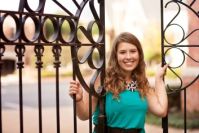
As a junior or senior in high school, everything becomes centered around college: where to go, AP credits, costs, recommendation letters, programs, scholarships. But the million-dollar question, the one at the heart of every conversation, is simply “What do you want to do with the rest of your life?” Wow. If that’s not a mind-blowing question, I don’t know what is. For some of us, it’s not an issue. Maybe you’ve known since you were ten that you wanted to be a doctor. But for others, it’s a head-scratcher, an elusive goal - tangible, but just a little too far off yet.
I was one of those kids who knew immediately what I thought I wanted. I was going to be a psychologist of some variety. In my soul-searching for universities with great programs, I needed to narrow down what kind of psychologist I’d like to be; it turned out to be one with a focus in the criminal justice system. I was so excited to have my life figured out, at least in terms of my career. But when I took my first class in the department, it just felt wrong. I’d also done some volunteering back home with an organization that works closely with young adults with special needs, and I really missed what I’d been doing there. So, armed with the knowledge that criminal justice wasn’t for me and little else, I hung my head and let fear of the unknown overtake me.
However, my knight in shining armor wasn’t long in coming. Thanks to the wide array of intelligent, driven, experienced people who have participated in the Social Science Scholars Program, I met a woman who was able to give me a renewed sense of direction. Every other class period of the program is filled with guest speakers of expertise in their subject, and this particular session brought me exactly what I needed to hear. Ellen Cokinos came in one day to speak about working in non-profit organizations, bringing her vast knowledge of the industry.
Ellen Cokinos completed a B.A. degree with concentrations in criminal justice and psychology at Michigan State and followed it with a Masters in Social Work. She then embarked on a career serving at-risk children. As a foster care caseworker for abused children in Michigan, Ellen identified many flaws in the existing system. The Children’s Protective Services Agency swiftly promoted her to positions in which she could make a difference on a large scale. Her passion and wisdom paid dividends. In Texas, where she had moved, Ellen helped bring about significant improvements in how cases of sexual abuse are handled by the civil and criminal court systems. Reflecting on Ellen’s many achievements on behalf of abused children, in 1998 Secretary of State Hillary Clinton, then First Lady of the United States, described her as ‘a force of nature’ who ‘uses her talents and energy on behalf of the most vulnerable people in our society.’ Subsequently, Ellen opened her own non-profit in Texas. Extremely skilled in fundraising, she became a consultant for other non-profits. Not least because she only works with organizations about whose causes she cares deeply, Ellen has continued to make an enormously positive difference.
In class, Ellen spent some time discussing with us possibilities in the non-profit industry and told us how almost any career has a parallel in the not-for-profit sector. She went over individual options with students and walked us through her path and highlighted how she has been able to fashion a career that is both emotionally and financially rewarding. As she was presenting, I felt something click. All of the confusion lifted as I realized that it was possible to have a very good life while serving a community, and I knew this was something I wanted to pursue. After hearing her speak, I sent Ellen a long email asking for her guidance - possible options, appropriate majors, and areas in which I might work. She took the time to respond in detail about opportunities, internships, and majors for me to look into. I acted upon her suggestion to consider Human Development and Family Studies as an additional major to Psychology and met with an advisor. When I left the advising appointment, I felt so validated in my decision, and completely at peace with the advice and wise words Ellen had given me. I quickly emailed her again, thanking her for the time she had committed to me, and she again responded in the most encouraging way: excited for my goals and letting me know she’d be there if I needed anything.
Many other students in the program have similar stories to share about mentors they’ve met through the Social Science Scholars Program. The people we’ve been introduced to are all willing to help out, provide opportunities, and generally support our academic careers and lives beyond the classroom. Being given a support system from experts at MSU and beyond is an incredible feeling, one that has opened many doors for the future and will impact lives for years to come.
My Experience So Far
by Greg Anderson
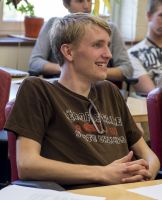
MSU has been an acculturating experience for me. My life had been a series of never quite fitting in. I was either poor in a rich area, liberal in a conservative area, or just me in a society that didn’t understand me. I was worried about college and fitting in. I have always found it difficult to make friends especially with my peers. I will admit the first few weeks were hard. I was away from home and didn’t know anyone well. However my first day gave me confidence that I would fit in; the Social Science Scholars Program gave me a group of friends I continue looking forward to getting to know better. We spent our first day as MSU students building flower beds and weeding as a Service Learning project. That day set the tone for this semester. You learn a little about people being in the same classroom together, but you learn a lot more when you work together doing things with people. That first day was a highlight of this past semester. Throughout the rest of the semester it was only reinforced that MSU was a good fit for me. I have had many opportunities to see operas, attend concerts, watch theater, design research with professors, stay up into the early morning discussing philosophy, and even do dance improvisation. This semester has been stretching in many ways and I love it. I also had an opportunity to volunteer for MSU’s Sexual Assault Crisis Intervention Team which requires an application process and 44 hours of training. It was a heavy experience, but it was good. I know that MSU will continue to provide these opportunities in the years to come and I am only limited by my willingness to step out and try something new.
In Praise of a Mentor: Doug Scott
by Elias Kokaly
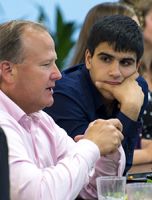
A mentor is an experienced and trusted advisor who will guide a student throughout his or her undergraduate years; an individual full of expertise, leadership, and skills, who is willing to share his or her experience in order to help lead a mentee to success. A mentor’s goal is to see the mentee happy and enjoying his or her college career and to provide advice that helps to ensure that students will make the right decisions and acquire the skills that will assist them in standing out among their peers. My experience with my mentor, Doug Scott, General Manager of Headhunting Services (Movement Search) has been great. I know that I can and will go to him for help and advice and that he will be there to listen when I need him. The relationship between a mentor and mentee obviously takes time to develop but we have begun to get to know one another over the last few months. Whenever Doug is in town, we meet and talk. We were able to tailgate at the Michigan vs. Michigan State football game with the bonus that Michigan State scored a victory. Over Christmas break, I have also been given the opportunity to visit Doug’s company and job shadow him. I recognise that this is an exceptional opportunity for a college freshman because it will provide me with insight into the corporate world that I cannot learn in the classroom. I am extremely grateful for this opportunity and very appreciative of my mentor’s generosity and dedication to MSU and the Social Science Scholars Program.
In Praise of a Mentor: Arnold Weinfeld
by Mark Zucarro
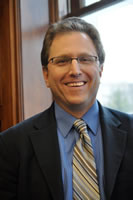
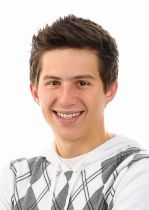 My mentor is Mr. Arnold Weinfeld, CEO and Board Chair of Prima Civitas Foundation, a non-profit economic and community development organization that works to strengthen Michigan's economy. My experience with Mr. Weinfeld has been great. He is friendly and easy to talk with: it is enjoyable to go out and have lunch at Grand Traverse Pie Company or Cosi, just to catch up on things every few weeks. He is also well connected and enormously helpful in making contacts that will help me to attain my goals. When we meet he not only offers me studying advice and tickets to MSU home games, but also offers networking opportunities. Within just a few weeks of the start of the semester, Mr. Weinfeld was able to set up an appointment for me with a local district judge, Laura Baird. This opportunity to shadow a local professional will provide me with excellent experience and a deeper understanding of my desired field of work; I will also be able to successfully network myself. This is just one example of the benefits of the mentorship within the Social Science Scholars Program. Mr. Weinfeld will undoubtedly have a great impact on my success at MSU and in my future work experiences. I feel very grateful to be a part of a program with such a resourceful mentorship network.
My mentor is Mr. Arnold Weinfeld, CEO and Board Chair of Prima Civitas Foundation, a non-profit economic and community development organization that works to strengthen Michigan's economy. My experience with Mr. Weinfeld has been great. He is friendly and easy to talk with: it is enjoyable to go out and have lunch at Grand Traverse Pie Company or Cosi, just to catch up on things every few weeks. He is also well connected and enormously helpful in making contacts that will help me to attain my goals. When we meet he not only offers me studying advice and tickets to MSU home games, but also offers networking opportunities. Within just a few weeks of the start of the semester, Mr. Weinfeld was able to set up an appointment for me with a local district judge, Laura Baird. This opportunity to shadow a local professional will provide me with excellent experience and a deeper understanding of my desired field of work; I will also be able to successfully network myself. This is just one example of the benefits of the mentorship within the Social Science Scholars Program. Mr. Weinfeld will undoubtedly have a great impact on my success at MSU and in my future work experiences. I feel very grateful to be a part of a program with such a resourceful mentorship network.

